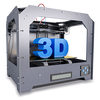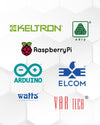
The Future of Hobby Electronics
How Will Society, Automation, Customization, and the Next Generation Influence the Future?
We asked hobbyists to take out their crystal balls and provide their predictions about the future of their beloved electronics hobby. They did, and we've discovered that predictions about the hobby's future are dependent upon a few different variables and perspectives.
Defining Electronics as a Hobby and its Future
When it comes to our hobbyists' perspectives, those that define the hobby as one consisting primarily of discrete component designs tend to view the hobby as one that is slowly fading. Responses such as, "Surface mount components will make life more difficult for the beginner when no through-hole equivalent is available," and, "Unfortunately it is dying due to mass produced pre-made circuits. The simple things we learned on by making ourselves are almost gone due to packaged circuits and kits," described a common observation and fear for the future of a booming electronics hobby.
Others do not see the hobby's future demise, but instead, see a future of metamorphosis. As one respondent put it, "When people think electronics they aren't thinking transistor, resistor, capacitor ICs; they are thinking cellphone and iPad..." Many believe digital technologies will eventually saturate the hobby market and that the hobby market will emphasize modules and programming instead of components.
Miniaturization of Components
Moore's Law, the observation that the number of transistors that are able to fit on an integrated circuit will continue to double each year, was stated in 1965 by Intel co-founder Gordon Moore. Though his statement gained popularity ten years later, after it had been revised to note that the doubling would instead occur every two years, his predictions have remained accurate, partially due to the utilization of his law as a driving production model within the semiconductor industry.
Many speculated that the increasingly smaller size of the components would eventually lead to the obsolescence of the hobby and the "need for smaller glasses." We heard, "The hobby is likely to decline as components become smaller, more integrated, more design specific, and less available in unit quantities," and, "Individual components will become so small that the average hobbyist will not be able to produce a PCB and solder components to it."
Yet still, others do not see miniaturization as a limiting factor but instead one that can bring beneficial potential. One participant summarized, "[hobby electronics] will continue to thrive, although in new ways, as miniaturization provides so many new opportunities." One respondent saw both sides of the coin stating, "Development and innovation will continue and things will get smaller but repairing something for yourself will become impossible."
The Next Generation of Electronics Hobbyists
When it comes to the perception of modern culture and the interests and capabilities of the upcoming generation of hobbyists, many believe them to be uninterested in tasks that aren't instantaneous. They also see a lack of mentors and education, and whether by witness or belief, they feel that the upcoming generation is not taught to think analytically. Many fear that generations growing up deluged with automation will not be turned on to tasks that involve piece-by-piece assembly.
We heard, "[the] younger generation is moving away from fundamentals and trending toward putting together pre-made modules," and, "The next generation doesn't have the patience," and, "It will have a tough time competing for the interest and time of present and future generations, given the social media, online distractions and expected shortly 'action to result' spans.
Another hobbyist was not so quick to generalize an entire generation. "No matter how the technology changes there will always be some who either want to find out how it works just to work with it themselves for their own learning and enjoyment, or for the satisfaction and/or money-saving aspect of fixing commercial electronics for themselves or friends, or to be able to design/build whatever the heck they want, maybe with an eye towards a career."
Others see the recent cultural shift toward automation and digital technologies and its technically inclined upcoming generations as beneficial to the hobby. "As electronics become more essential to everyday life, a hobby centered on it will become important to an average life." Being exposed to digital technology at a younger age could mean they'll be more likely to get into the hobby earlier and with a better understanding how modern technologies work, they'll expand what modern technologies are capable of. Many stated computing and programming will be even more necessary for all electronics.
Comments such as, "There are going to be more and more people in the field as products like Arduino and Raspberry PI become more like small building blocks. Kids are also more tech-savvy," and, "A higher percentage of the population will become involved in electronics projects. With videos, internet access, and easy to use IC's there are an unlimited number of things people can do that they never could have done in the past," and, "I'm frequently astonished by the advanced work that can be achieved now without the lengthy study for understanding or preparation that has been traditionally needed. I think that trend will continue to surprise."
Individuals connecting instantaneously across miles and borders could provide greater opportunity for acquiring and spreading knowledge and that will benefit their electronics projects. As one lobbyist said, "Great advances will result in electronics when hobbyists start producing integrated circuits in an open-source environment..." Another emphasized, "Open-source and project information sharing will reduce the cost complexity apprehensiveness of starting bigger and more complex projects."
Collaboration and Customization: IoT, 3D Printing, and the Maker Movement
Hobbyists noted that the Internet of Things (IoT) "will increase the number of hobbyists," and will be a catalyst for achieving great leaps and bounds in the hobby's future. "It's going to get more complex and is going to involve increasing amounts of computer science as we integrate with more microcontrollers and add more interconnectivity," and, "The Internet of Things will open it up... you don't need a college degree to program a microcontroller and design things, these are exciting times with the Maker Movement, it is growing fast," were commentary echoed by many.
Mark Hatch, the maker, TechShop founder, and author of The Maker Movement Manifesto writes, "Making is fundamental to what it means to be human. We must make, create, and express ourselves to feel whole. There is something unique about making physical things. These things are like little pieces of us and seem to embody portions of our souls." Since its founding, the Maker Movement has begun to transform the hobby world and has continued to gain in popularity, perhaps because it's natural for humans to create.
Our hobbyists noted that they were witnessing a cultural shift in hobby electronics and that a sort of revival was happening, thanks to the new found popularity of making. "For a long time, it looked as if electronic as a hobby was a dying art. However, with the maker movement and the popularity of microcontrollers (Raspberry Pi, Arduino, etc.), there is hope for a new generation of electronic enthusiasts."
They also see this trend continuing into the unforeseeable future and one that will benefit the average hobbyist more than it has in the past. "It'll probably grow to be a marketable industry for the casual hobbyist (i.e., someone who doesn't want to run a "business," but doesn't mind selling what they've made)."
As 3D printing becomes more popular, several participants suggest that 3D Printers will become ubiquitous and increasingly more affordable and that their usage in electronics projects will bring new levels of customization and improvements. Participants saw a future where 3D printers print components, Circuit Boards and even entire projects.
A Future Full of Artificial Intelligence, Virtual Reality, Animal and Machine Integration, and Renewable Energy
Let's not leave out the projects that some participants saw growing in popularity that could vastly change the world we know today. Renewable Energy projects, Artificial Intelligence (AI), Virtual Reality (VR) and machine and biological integration were mentioned by more than a few participants. Participants' crystal balls and astute observations led them to believe that the future will be "robotic centric," and, "artificial intelligence will greatly improve," and, "AI is the new frontier." Some took it a step further to note that animal and/or human and machine-biological integration will be commonplace in the future.
Virtual Reality has the potential to augment research and to implement cultural changes that are practically unimaginable at this point. One participant spoke of people using VR to take vacations all over the world without leaving their homes; others mentioned a world where VR and digital automation completely replace the reality we know today.
Hobbyists also saw a future where smart, self-driving cars would transform the transportation industry. A strong group also proclaimed that advances in electronics will lead to better utilization of natural and sustainable resources thus helping to restore the planet.
Tomson Electronics and the Future of Hobby Electronics
Whatever the future holds for electronics as a hobby, I think that we can all agree that, "it should remain an important, rewarding, life-long endeavor for many individuals." We at Tomson Electronics know we'll be here to continue supporting the fascinating creations that electronics hobbyist build day in and day out for years to come and we'll continue to offer a myriad of kits and hard to find components to inspire hobbyists of all types.



